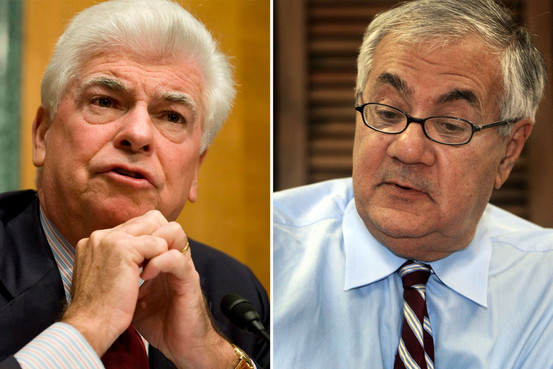The State National Bank of Big Spring, Texas, has filed a lawsuit asking the U.S. District Court for the District of Columbia to hear its case challenging the constitutionality of provisions of the Dodd-Frank Wall Street Reform and Consumer Protection Act.
The Competitive Enterprise Institute and the 60 Plus Association are also joining this community bank as plaintiffs in the same action, requesting the Court invalidate the law because of the unprecedented, unchecked power it gives the government.
“No other federal agency or commission operates in such a way that one person can essentially determine who gets a home loan, who can get a credit card and who can get a loan for college,” said Jim Purcell, CEO of State National Bank. “Dodd-Frank effectively gives unlimited regulatory power to this so-called Consumer Financial Protection Board, also known as CFPB, with a director who is not accountable to Congress, the President or the Courts. That is simply unconstitutional.”
No Checks and Balances
The complaint argues there are no effective checks and balances to assure accountability to the public. Most importantly, the suit states:
- Congress exercises no “power of the purse” over the CFPB, because the agency’s budget – administered essentially by one person – comes from the Federal Reserve, amounting to approximately $400 million that Congress cannot touch or regulate.
- The President cannot carry out his constitutional obligation to “take care that the laws be faithfully executed,” because the President cannot remove the CFPB Director except under limited circumstances.
- Judicial review of the CFPB’s actions is limited, because Dodd-Frank requires the courts to give extra deference to the CFPB’s legal interpretations.
Unrestrained, Unaccountable Power
The plaintiffs claim in their suit that Dodd-Frank gives an agency of unelected government bureaucrats unrestrained power. They argue this unaccountable power over the daily lives of the American people results in a lack of public accountability, creating a power grab over every U.S. citizen.
“As a whole, Dodd-Frank aggregates the power of all three branches of government in one unelected, unsupervised and unaccountable bureaucrat,” said former White House Counsel C. Boyden Gray, attorney for the plaintiffs and founder of Boyden Gray & Associates.
“Dodd-Frank is to financial reform like a tsunami is to a slightly dry lawn — all-enveloping, hugely destructive, and pretty much unaccountable to whoever unleashed it,” said CEI General Counsel Sam Kazman.
Although some in the Obama Administration argue the CFPB will be overseen by the Dodd-Frank Financial Stability Oversight Council, the FSOC’s review is practically nonexistent. It can overturn a CFPB regulation under only limited circumstances, and even then only if seven of the 10 FSOC members, including the CFPB director himself, vote to overturn the CFPB’s rule. Most importantly, the Council has no power to oversee the CFPB’s enforcement activities, which is the CFPB’s preferred method of lawmaking.
‘Accountable to No One’
“The Consumer Financial Protection Bureau’s lack of checks and balances violates the Constitution’s separation of powers. Its director is like a czar,” said CEI attorney Hans Bader. “He is not accountable to anyone, and can’t be fired even if voters elect a president with different ideas about how to protect consumers.”
Bader noted the usual rule under the Constitution is that the president may fire department heads at will. He said the Supreme Court made this clear in its Myers v. U.S. decision of 1926, which struck down a contrary law. An exception to this rule covers multi-member agencies with a “quasi-legislative” role. But that exception doesn’t cover the CFPB, which is headed by a single leader not subject to collegial oversight.
“The CFPB’s director is as different from traditional independent agencies as a dictator is from a legislature,” Bader said. “Unlike the chairman of an independent agency like the SEC, who can be outvoted by fellow commissioners if he oversteps his authority, the CFPB’s director is accountable to no one. He is not accountable to the democratically elected President, unlike cabinet secretaries, who can be removed at will by the President.
“If the CFPB’s sole director can be given immunity from removal, so, too, could cabinet secretaries, who could be given life tenure, enabling them to thwart the very changes that a newly elected President was elected to carry out,” Bader added.
‘Larger Than Obamacare’
60 Plus Association Chairman Jim Martin said the Dodd-Frank law is “a monster of a statute, larger even than Obamacare, that regulates practically every financial service and institution in the country. And it does this in ways that are unconstitutional.”
He said the CFPB’s director is a “finance czar who’s unaccountable to the President, to Congress, and in a sense even to the courts. Now Dodd-Frank sounds like it will give seniors reform and protection, but in fact it will restrict financial products such as mortgages and credit, and make them more expensive to boot. At the same time, it undermines the Constitution’s checks on government power. It’s a law that cries out for judicial scrutiny.”
Christine Hall ([email protected]) is director of communications at the Competitive Enterprise Institute.




